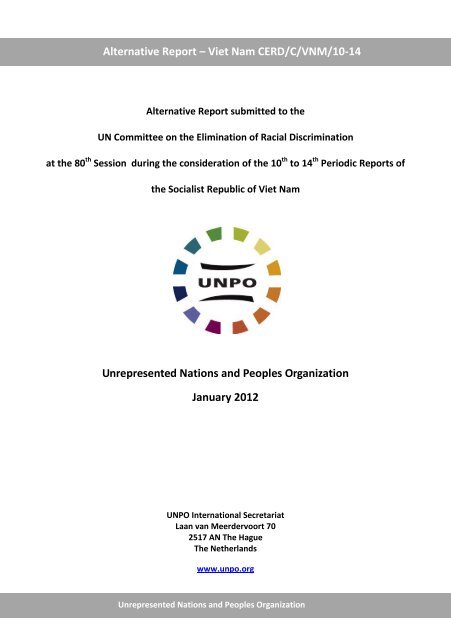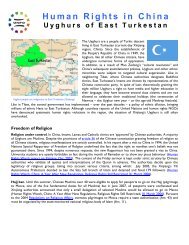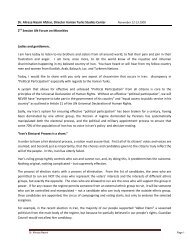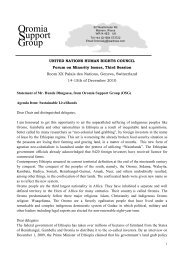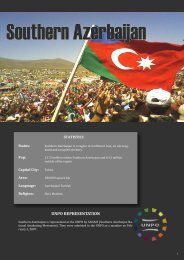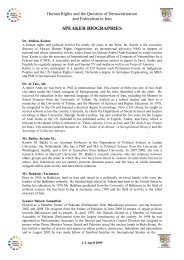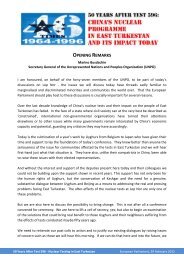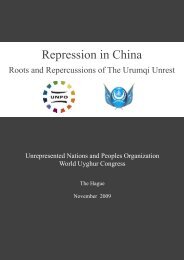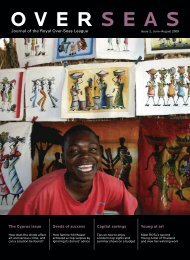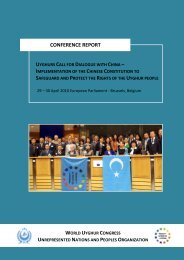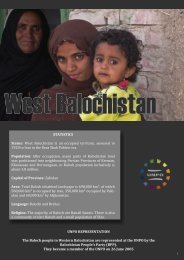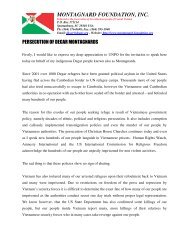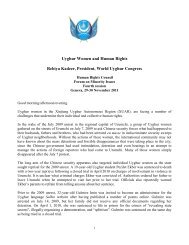Alternative Report - Office of the High Commissioner for Human Rights
Alternative Report - Office of the High Commissioner for Human Rights
Alternative Report - Office of the High Commissioner for Human Rights
Create successful ePaper yourself
Turn your PDF publications into a flip-book with our unique Google optimized e-Paper software.
<strong>Alternative</strong> <strong>Report</strong> – Viet Nam CERD/C/VNM/10-14streng<strong>the</strong>n its ef<strong>for</strong>ts to change popular perceptions about minorities and enhance <strong>the</strong> capacity <strong>of</strong>Government staff and institutions to better serve <strong>the</strong>ir interests.” 6Recommendation: Recognize that that political, social and economic marginalization <strong>of</strong> minority indigenouspeoples in Viet Nam is unequivocally linked to <strong>the</strong> existence <strong>of</strong> racial discrimination at all levels <strong>of</strong> society andstate.Recommendation: Establish a comprehensive definition <strong>of</strong> racial discrimination in accordance with Article 1.1<strong>of</strong> <strong>the</strong> International Convention on <strong>the</strong> Elimination <strong>of</strong> All Forms <strong>of</strong> Racial Discrimination.Recommendation: Provide a public education campaign to address ethnically discriminatory attitudesoriginating from within State institutions in consultation with organizations representing <strong>the</strong> views andconcerns <strong>of</strong> indigenous peoples and ethnic minorities.Question: How accessible is <strong>the</strong> Committee <strong>for</strong> Ethnic Minority Affairs and similar agencies to citizens andcivil society groups who wish to raise concerns? Please provide in<strong>for</strong>mation regarding its independence fromstate influence.Question: What steps have <strong>the</strong> Vietnamese National Assembly’s Ethnic Council and similar agencies taken toensure representation <strong>of</strong> indigenous peoples and ethnic minorities and to complete <strong>the</strong>ir respectivemandates?Article 1.4 – Recognition as indigenous peoplesArticle 1.4 states that “special measures taken <strong>for</strong> <strong>the</strong> sole purpose <strong>of</strong> securing adequate advancement <strong>of</strong>certain racial or ethnic groups or individuals requiring such protection as may be necessary in order to ensuresuch groups or individuals equal enjoyment or exercise <strong>of</strong> human rights and fundamental freedoms shall notbe deemed racial discrimination, provided, however, that such measures do not, as a consequence, lead to<strong>the</strong> maintenance <strong>of</strong> separate rights <strong>for</strong> different racial groups and that <strong>the</strong>y shall not be continued after <strong>the</strong>objectives <strong>for</strong> which <strong>the</strong>y were taken have been achieved.”Viet Nam does not recognize <strong>the</strong> indigenous nature <strong>of</strong> <strong>the</strong> Khmer Krom and <strong>the</strong> Degar Montagnard peoples,despite having endorsed and ratified <strong>the</strong> United Nations Declaration on <strong>the</strong> <strong>Rights</strong> <strong>of</strong> Indigenous Peoples(UNDRIP). In 2010, a representative from <strong>the</strong> Vietnamese Mission to <strong>the</strong> United Nations attempted to block<strong>the</strong> participation <strong>of</strong> an NGO representing <strong>the</strong> indigenous Montagnard people in Viet Nam at <strong>the</strong> UNConference on <strong>the</strong> Expert Mechanism on <strong>the</strong> <strong>Rights</strong> <strong>of</strong> Indigenous Peoples. The representative was cited assaying that because <strong>the</strong>re were no indigenous peoples in Viet Nam, <strong>the</strong> NGO in question had no right toattend. 7The state’s refusal to recognize <strong>the</strong> indigeneity <strong>of</strong> certain groups means <strong>the</strong>se indigenous groups are not<strong>of</strong>fered special protection in Vietnamese law, despite <strong>the</strong>ir historic status and contemporary6 United Nations <strong>Human</strong> <strong>Rights</strong> Council (2011) <strong>Report</strong> <strong>of</strong> <strong>the</strong> independent expert on <strong>the</strong> question <strong>of</strong> human rights andextreme poverty, Magdalena Sepúlveda Carmona: Addendum, Mission to Viet Nam. (A/HRC/17/34/Add.1) para.287 Montagnard <strong>Human</strong> <strong>Rights</strong> Organization (2010) MHRO attends UN Conference on Indigenous Peoples in Geneva.Retrieved from http://www.mhro.org/mhro-attends-un-conference-on-indigenous-peoples-in-geneva6Unrepresented Nations and Peoples Organization
<strong>Alternative</strong> <strong>Report</strong> – Viet Nam CERD/C/VNM/10-14marginalization. Vietnamese law makes no provisions <strong>for</strong> <strong>the</strong> recognition <strong>of</strong> indigenous peoples, nor does itprovide <strong>for</strong> <strong>the</strong> recognition <strong>of</strong> any specific rights <strong>for</strong> ethnic minorities regarding land, cultural protection andfree socio-economic development. 8Recommendation: Formally recognize <strong>the</strong> Degar Montagnards and <strong>the</strong> Khmer Krom as indigenous peoples <strong>of</strong>Viet Nam, and respect <strong>the</strong> distinct rights af<strong>for</strong>ded to <strong>the</strong>m by <strong>the</strong> UN Declaration on <strong>the</strong> <strong>Rights</strong> <strong>of</strong> IndigenousPeoples.Recommendation: Formally endorse and ratify International Labor Organization Convention 169 onIndigenous and Tribal peoples.Article 5 (a) – Equal treatment be<strong>for</strong>e courtArticle 5 (a) guarantees “[t]he right to equal treatment be<strong>for</strong>e <strong>the</strong> tribunals and all o<strong>the</strong>r organsadministering justice.”The State report to <strong>the</strong> Committee lacks in<strong>for</strong>mation regarding challenges faced by Vietnamese justiceinstitutions in fairly processing individuals from indigenous and ethnic minority communities. Under <strong>the</strong>guise <strong>of</strong> vaguely-defined national security charges, Khmer Krom, Degar Montagnard and Hmong individualsand activists have been sentenced long prison terms after trials <strong>of</strong>ten distorted by political influence,endemic corruption and inefficiency. 9 Additionally, credible reports have surfaced that Vietnamese <strong>of</strong>ficialspressured defense lawyers not to take as clients any religious or democracy activists facing trial. Severallawyers who took such cases experienced harassment, arrest, conviction, and even disbarment. 10The Degar Montagnards’ participation in public protests and worship in unregistered house churches havemade <strong>the</strong>m subject to charges <strong>of</strong> “undermining national solidarity” or “disrupting security.” Degar peoplewho have been arrested trying to seek political asylum in neighboring countries have been charged with“fleeing abroad to oppose <strong>the</strong> People’s Administration.” 11 Khmer Krom individuals have been arrested afterfiling legitimate legal complaints. In May 2009, Mr. Huynh Ba was arrested after filing a complaint about hisconfiscated farm lands, and was charged with attempting to “disturb Vietnamese society.” His family hasreported that Vietnamese <strong>of</strong>ficials have not released his location or <strong>the</strong> duration <strong>of</strong> his imprisonment. 12Recommendation: Amend domestic law provisions that criminalize certain religious activities on <strong>the</strong> basis <strong>of</strong>imprecisely-defined crimes <strong>of</strong> national security.Recommendation: Release all prisoners who have been detained as a result <strong>of</strong> <strong>the</strong>ir nonviolent political andreligious beliefs and practices.8 Troung, L.T. & Genotiva O.M. (2010) Recognizing Ethnic Minority Customary Land <strong>Rights</strong> in Vietnam and <strong>the</strong>Philippines9 United States Department <strong>of</strong> State (2011) 2010 <strong>Human</strong> <strong>Rights</strong> <strong>Report</strong>: Vietnam. Retrieved fromhttp://www.state.gov/g/drl/rls/hrrpt/2010/eap/154408.htm10 ibid11 <strong>Human</strong> <strong>Rights</strong> Watch (2011) Montagnard Christians in Vietnam: A Case Study in Religious Repression12 The Khmer Krom Network (2009) Vietnam Authority Arrests Land Activists Huynh Ba, Retrieved fromhttp://khmerkrom.net/node/19567Unrepresented Nations and Peoples Organization
<strong>Alternative</strong> <strong>Report</strong> – Viet Nam CERD/C/VNM/10-14The Committee has established that <strong>the</strong> principle <strong>of</strong> non-refoulement must be observed regarding allrefugees and displaced persons without distinction as to race, color, or national or ethnic origin. All suchpeople have <strong>the</strong> right to return to <strong>the</strong>ir country <strong>of</strong> origin provided it is voluntary and under conditions <strong>of</strong>safety. 16 Viet Nam’s actions regarding <strong>for</strong>ced extradition and repatriation <strong>of</strong> indigenous peoples and ethnicminorities constitute a severe violation <strong>of</strong> <strong>the</strong>se principles.The Hmong people <strong>of</strong> Laos continue to experience egregious human rights abuses at <strong>the</strong> hands <strong>of</strong> <strong>the</strong> Laogovernment. Many Hmong attempt to flee Laos in search <strong>of</strong> refuge from abuse. However, <strong>the</strong>ir escape is<strong>of</strong>ten blocked by <strong>the</strong> collaborative ef<strong>for</strong>ts <strong>of</strong> <strong>the</strong> Laotian and Vietnamese military on major <strong>of</strong>fensives totrack and detain all Hmong people in <strong>the</strong> Xaysomboun Special Zone and border areas. 17 Viet Nam is not asignatory to <strong>the</strong> 1951 and 1967 conventions relating to <strong>the</strong> status <strong>of</strong> refugees and has no legal system <strong>for</strong>providing protection to those seeking refuge or asylum. 18Many Degar Montagnard people have also sought refuge from Viet Nam’s oppression by attempting escapeto UN refugee camps in Cambodia. Through <strong>the</strong> coordination <strong>of</strong> <strong>the</strong> Vietnamese and Cambodiangovernments, hundreds <strong>of</strong> Degar people have been <strong>for</strong>cibly repatriated to Viet Nam. In 2005, <strong>the</strong> UN SpecialEnvoy to Cambodia expressed concerns <strong>of</strong> “reasons to believe that <strong>the</strong>re are people in <strong>the</strong> highlands on <strong>the</strong>o<strong>the</strong>r side <strong>of</strong> <strong>the</strong> border who have a justified fear <strong>of</strong> persecution by <strong>the</strong> Vietnamese government.” 19 KhmerKrom who flee abroad to Cambodia also continue to find <strong>the</strong>mselves under threat <strong>of</strong> <strong>the</strong> Vietnamesegovernment. <strong>Human</strong> <strong>Rights</strong> Watch uncovered a 2007 report by <strong>the</strong> National Borders Committee <strong>of</strong> VietNam’s Ministry <strong>of</strong> Foreign Affairs that described <strong>the</strong> cooperation between Viet Nam and Cambodia washighly effective in cracking down on Khmer Krom.“We have coordinated with our friends (CPP) in Cambodia to put a stop to <strong>the</strong>ir activities, includingbreaking up <strong>the</strong>ir schemes to demonstrate in front <strong>of</strong> our embassy during President Nguyen MinhTriet’s <strong>of</strong>ficial visit and preventing people from crossing <strong>the</strong> border into Takeo Province so that <strong>the</strong>ywill be able to set up ‘refugee camps’ <strong>the</strong>re.” 20Recommendation: Ratify <strong>the</strong> 1951 Convention on <strong>the</strong> Status <strong>of</strong> Refugees and halt any current and futurerefoulement <strong>of</strong> asylum-seekers.Recommendation: End <strong>the</strong> <strong>for</strong>ceful repatriation <strong>of</strong> indigenous peoples and ethnic minorities seeking refuge.Recommendation: Allow international observers to freely assess <strong>the</strong> conditions <strong>of</strong> detention or settlement <strong>of</strong>refugees placed in Vietnamese custody and to allow such observers unfettered access to any associated legalproceedings.16 United Nations <strong>Human</strong> <strong>Rights</strong> Council (1996) General Recommendation No. 22: Article 5 and refugees and displacedpersons (A/51/18)17 Society <strong>for</strong> Threatened Peoples (2006) They Hunt Us Like Animals: Massacres and grave human rights violationsagainst <strong>the</strong> Hmong in Laos18 United States Department <strong>of</strong> State (2011) 2010 <strong>Human</strong> <strong>Rights</strong> <strong>Report</strong>: Vietnam. Accessed fromhttp://www.state.gov/j/drl/rls/hrrpt/2010/eap/154408.htm19 Montagnard Foundation Inc. (2010) Persecution <strong>of</strong> <strong>the</strong> Degar Montagnards. Speech presented at UNPO Conference‘Returning Refugees: Extradition to Torture’ Rome20 <strong>Human</strong> <strong>Rights</strong> Watch (2011) On <strong>the</strong> Margins: <strong>Rights</strong> Abuses <strong>of</strong> Ethnic Khmer in Vietnam’s Mekong Delta9Unrepresented Nations and Peoples Organization
<strong>Alternative</strong> <strong>Report</strong> – Viet Nam CERD/C/VNM/10-14Article 5 (d)(v), (vi), & Article 5 (e)(i) – Right to property and employment opportunitiesArticle 5 (d)(v) is regarding “<strong>the</strong> right to own property alone as well as in association with o<strong>the</strong>rs.”Article 5 (e)(i) guarantees “[t]he rights to work, to free choice <strong>of</strong> employment, to just and favorableconditions <strong>of</strong> work, to protection against unemployment, to equal pay <strong>for</strong> equal work, to just and favorableremuneration.”Despite purported ef<strong>for</strong>ts by <strong>the</strong> Vietnamese government to address unemployment in regions where largeconcentrations <strong>of</strong> indigenous and minority peoples reside, many communities <strong>of</strong> Khmer Krom, DegarMontagnards and Hmong still face high jobless rates. In contrast to figures submitted in Viet Nam’s statereport, additional studies showed that even though <strong>the</strong> poverty rates among ethnic minorities has stoppedincreasing, <strong>the</strong> average income <strong>of</strong> ethnic minorities and mountainous regions is only 1/3 that <strong>of</strong> <strong>the</strong> nationalaverage. 21 This has resulted in disproportionate poverty levels within <strong>the</strong>se communities. In 2011, <strong>the</strong>United Nations Children’s Fund (UNICEF) reported that ethnic minority children in Vietnam have a povertyrate five times higher than <strong>the</strong> ethnic majority. 22Intrinsically linked to high unemployment and poverty rates is lack <strong>of</strong> access to fertile cultivation soils.Landlessness has increased among ethnic minorities. 23 This is fur<strong>the</strong>r complicated by Vietnamese landre<strong>for</strong>ms in 1975 which placed ownership <strong>of</strong> land with <strong>the</strong> State, which in turn assigns usage rights toindividuals. Natural resources which are abundant in ancestral domains are <strong>the</strong>re<strong>for</strong>e no longer available <strong>for</strong>indigenous communities’ use because <strong>the</strong>y are subject to government allocation. 24 Despite Viet Nam’srequirement to adhere to <strong>the</strong> UN Declaration on <strong>the</strong> <strong>Rights</strong> <strong>of</strong> Indigenous Peoples (UNDRIP) 25 , indigenousgroups such as <strong>the</strong> Khmer Krom and <strong>the</strong> Degar Montagnards report that large tracts <strong>of</strong> fertile farms andvaluable <strong>for</strong>est lands have been confiscated and reallocated to ethnic Kinh without fair compensation. Inmany instances, <strong>the</strong> indigenous families are relocated to areas that lack access to basic infrastructure andservices, including schools and healthcare facilities. This in turn leads to fur<strong>the</strong>r marginalization <strong>of</strong>indigenous communities. 26Recommendations: Ensure that any policies affecting indigenous peoples, especially regarding indigenousland rights, are in accordance with <strong>the</strong> United Nations Declaration on <strong>the</strong> <strong>Rights</strong> <strong>of</strong> Indigenous Peoples.21 IWGIA (2011) <strong>Report</strong> following workshop Solutions to Poverty Reduction and Stabilization <strong>of</strong> Ethnic and Mountainousareas in <strong>the</strong> period 2011-2015, 3 December 201022 United Nations Children Fund (2011) Child Poverty in East Asia and <strong>the</strong> Pacific: Deprivations and Disparities23 Trends in increasing landlessness among minority groups highlighted by AusAID’s 2004 Mekong Data Poverty Analysiswere shown to have continued. See: <strong>Human</strong> <strong>Rights</strong> Watch (2011) On <strong>the</strong> Margins: <strong>Rights</strong> Abuses <strong>of</strong> Ethnic Khmer inVietnam’s Mekong Delta24 United Nations <strong>Human</strong> <strong>Rights</strong> Council (2011) <strong>Report</strong> <strong>of</strong> <strong>the</strong> independent expert on minority issues, Gay McDougall:Addendum, Mission to Viet Nam. (A/HRC/16/45/Add.2) para.3125 Article 10 states: “Indigenous peoples shall not be <strong>for</strong>cibly removed from <strong>the</strong>ir lands or territories. No relocationshall take place without <strong>the</strong> free, prior and in<strong>for</strong>med consent <strong>of</strong> <strong>the</strong> indigenous peoples concerned and after agreementon just and fair compensation and, where possible, with <strong>the</strong> option <strong>of</strong> return.”26 United Nations <strong>Human</strong> <strong>Rights</strong> Council (2011) <strong>Report</strong> <strong>of</strong> <strong>the</strong> independent expert on minority issues, Gay McDougall:Addendum, Mission to Viet Nam. (A/HRC/16/45/Add.2) para.3610Unrepresented Nations and Peoples Organization
<strong>Alternative</strong> <strong>Report</strong> – Viet Nam CERD/C/VNM/10-14Despite a complete lack <strong>of</strong> evidence to support <strong>the</strong>se claims, <strong>the</strong> state remains suspicious <strong>of</strong> Degar Christiansthat do not join <strong>the</strong> government-authorized Sou<strong>the</strong>rn Evangelical Church <strong>of</strong> Vietnam (SECV). 31In <strong>the</strong> spring <strong>of</strong> 2011, Hmong villagers peacefully demonstrating <strong>for</strong> religious freedom were violentlysuppressed by Vietnamese security <strong>for</strong>ces using ground attack helicopters; dozens <strong>of</strong> protesters werereportedly killed. 32 Viet Nam has moved slowly to extend legal recognition to Hmong Protestant churchesdespite an Ordinance requiring timely responses to such applications. In <strong>the</strong> meantime, Vietnamese <strong>of</strong>ficialshave coordinated ef<strong>for</strong>ts to discourage Hmong communities from practicing Christianity. According to <strong>the</strong>US State Department, “local <strong>of</strong>ficials repressed [Hmong] Protestant believers in some parts <strong>of</strong> northwestprovinces by <strong>for</strong>cing church ga<strong>the</strong>rings to cease, closing house churches, confiscating property, andpressuring individuals to renounce <strong>the</strong>ir religious beliefs, though <strong>of</strong>ten unsuccessfully, despite <strong>the</strong>prohibition on <strong>for</strong>ced renunciations in <strong>the</strong> Prime Minister’s 2005 instructions on Protestantism.” The reporthas also included instances <strong>of</strong> contract thugs hired by local <strong>of</strong>ficials to “harass, threaten or beat” religiousleaders. 33Recommendation: Allow all independent religious organizations to freely conduct religious activities andgovern <strong>the</strong>mselves. 34Recommendation: Review implementation <strong>of</strong> Decree 22 which <strong>for</strong>bids <strong>for</strong>ced renunciations <strong>of</strong> faith especiallyas it disproportionately affects ethnic minorities.Recommendation: Amend Ordinance No. 21/2004/PL-UBTVQH11 on Beliefs and Religion to include aprovision that prohibits <strong>for</strong>ced renunciation ceremonies by government <strong>of</strong>ficials, linked to specific disciplinarymeasures <strong>for</strong> <strong>of</strong>fenders. 35Recommendation: En<strong>for</strong>ce provisions in Instruction No. 01/2005/CT-TTg, “Some Work RegardingProtestantism,” that outlaw <strong>for</strong>ced renunciations <strong>of</strong> faith and establish specific penalties <strong>for</strong> those who carryout such practices. 36Article 5 (e)(v) – Education in own languageArticle 5 (e)(v) protects “[t]he right to education and training.”Indigenous peoples and ethnic minorities report that despite existing legislation to protect minoritylanguages and integrate <strong>the</strong>m into state schools, <strong>the</strong> Vietnamese government bans publications in <strong>the</strong>ir31 <strong>Human</strong> <strong>Rights</strong> Watch (2011) Montagnard Christians in Vietnam: A Case Study in Religious Repression32 <strong>Human</strong> <strong>Rights</strong> Watch (2011) Vietnam: Investigate Crackdown on Hmong Unrest, Retrieved fromhttp://www.hrw.org/en/news/2011/05/17/vietnam-investigate-crackdown-hmong-unrest33 United States Commission on International Religious Freedom (2011) USCIRF Annual <strong>Report</strong> 2011: Countries <strong>of</strong>Particular Concern: Vietnam, Retrieved from http://www.unhcr.org/refworld/docid/4dbe90bdc.html34 <strong>Human</strong> <strong>Rights</strong> Watch (2011). “Montagnard Christians in Vietnam: a case study in religious repression.” Retrievedfrom http://www.hrw.org/node/9763235 <strong>Human</strong> <strong>Rights</strong> Watch (2011). “Montagnard Christians in Vietnam: a case study in religious repression.” Retrievedfrom http://www.hrw.org/node/9763236 <strong>Human</strong> <strong>Rights</strong> Watch (2011). “Montagnard Christians in Vietnam: a case study in religious repression.” Retrievedfrom http://www.hrw.org/node/9763212Unrepresented Nations and Peoples Organization
<strong>Alternative</strong> <strong>Report</strong> – Viet Nam CERD/C/VNM/10-14respective languages and fails to provide adequate education in minority languages. Bilingual education<strong>of</strong>fered on paper by <strong>the</strong> State does not entail instruction in languages o<strong>the</strong>r than Vietnamese, but ra<strong>the</strong>r <strong>the</strong>teaching <strong>of</strong> minority languages as a noncompulsory subject. During her 2010 Mission to Viet Nam, <strong>the</strong> UNIndependent Expert on Minority Issues noted that <strong>the</strong> lack <strong>of</strong> early instruction in a mo<strong>the</strong>r tongue can createa language barrier <strong>for</strong> children who begin <strong>the</strong>ir education with little if any understanding <strong>of</strong> Vietnamese. 37Indigenous students have given first-hand accounts <strong>of</strong> <strong>the</strong>ir experiences in this respect:“When I started first grade in public school I had to learn everything in Vietnamese, but I couldn'tspeak Vietnamese at all. The Vietnamese students, even teachers, made fun <strong>of</strong> us [Khmer Krom] andmade us feel that we were not welcome," said Serey Chau, president <strong>of</strong> <strong>the</strong> Khmer KromFederation's Youth Council.In March 2008, <strong>the</strong> state-run VietnamNet news site reported that Khmer students were "droppinglike flies" out <strong>of</strong> school. "Most <strong>of</strong> <strong>the</strong> students with bad learning capacity are <strong>of</strong> Khmer minority; <strong>the</strong>ycannot speak Vietnamese well and cannot follow <strong>the</strong> study curriculum," a local teacher told <strong>the</strong>m.The report said 56% <strong>of</strong> drop-outs are from <strong>the</strong> Khmer minority, with 30% <strong>of</strong> this figure leaving due to<strong>the</strong>ir "inability to learn." 38Under Article 16 <strong>of</strong> <strong>the</strong> Vietnamese Law on Child Protection, Care and Education, public primary educationshould be free. However, many communities and NGOs report that tuition fees continue to be charged toparents <strong>of</strong> indigenous and minority children, preventing many <strong>of</strong> <strong>the</strong>se children from attending school. 39In addition to language barriers, indigenous and minority children face stigma and harassment from school<strong>of</strong>ficials, creating an environment unsuitable <strong>for</strong> education. Degar Montagnard students report thatteachers and local authorities have used classrooms as an opportunity to interrogate students about <strong>the</strong>irand <strong>the</strong>ir family’s religious affiliation, and have subsequently expelled Montagnard Christian students on <strong>the</strong>basis <strong>of</strong> <strong>the</strong>ir religion. In a 2011 report to <strong>the</strong> Committee on <strong>the</strong> <strong>Rights</strong> <strong>of</strong> <strong>the</strong> Child, <strong>the</strong> Degar MontagnardYouth Group cited a case in which a Montagnard graduate was barred from boarding school because herfamily refused to sign a document renouncing <strong>the</strong>ir affiliation with an unregistered house-church and to<strong>the</strong>n join a state sanctioned church organization. 40Recommendation: Increase opportunities <strong>for</strong> instruction in minority languages. In service <strong>of</strong> this goal,increase <strong>the</strong> training and certification <strong>of</strong> indigenous and minority teachers to provide native-languageinstruction, and ensure that opportunities to do so in <strong>the</strong>ir home communities are both available andsufficiently compensated.Recommendation: Investigate and ensure accountability <strong>for</strong> discrimination against indigenous and ethnic orreligious minority students and teachers.37 United Nations <strong>Human</strong> <strong>Rights</strong> Council (2011) <strong>Report</strong> <strong>of</strong> <strong>the</strong> independent expert on minority issues, Gay McDougall:Addendum, Mission to Viet Nam. (A/HRC/16/45/Add.2) para.5338 Guthrie, C. (2009) Khmer Krom hero rises from <strong>the</strong> delta, Retrieved fromhttp://www.atimes.com/atimes/Sou<strong>the</strong>ast_Asia/KF06Ae03.html39 Degar Montagnard Youth Group (2011) <strong>Alternative</strong> <strong>Report</strong> on Vietnam’s Implementation <strong>of</strong> <strong>the</strong> United NationsConvention on <strong>the</strong> <strong>Rights</strong> <strong>of</strong> <strong>the</strong> Child in <strong>the</strong> 2002-2011 Period. p 6.40 ibid13Unrepresented Nations and Peoples Organization
<strong>Alternative</strong> <strong>Report</strong> – Viet Nam CERD/C/VNM/10-14Article 5 (d)(i), (ii) – Principle <strong>of</strong> non-refoulement, and non-expulsion <strong>of</strong> refugeesRecommendation: Ratify <strong>the</strong> 1951 Convention on <strong>the</strong> Status <strong>of</strong> Refugees and halt any current and futurerefoulement <strong>of</strong> asylum-seekers.Recommendation: End <strong>the</strong> <strong>for</strong>ceful repatriation <strong>of</strong> indigenous peoples and ethnic minorities seeking refuge.Recommendation: Allow international observers to freely assess <strong>the</strong> conditions <strong>of</strong> detention or settlement <strong>of</strong>refugees placed in Vietnamese custody and to allow such observers unfettered access to any associated legalproceedings.Article 5 (d)(v), (vi), & Article 5 (e)(i) – Right to property and employment opportunitiesRecommendations: Ensure that any policies affecting indigenous peoples, especially regarding indigenousland rights, are in accordance with <strong>the</strong> United Nations Declaration on <strong>the</strong> <strong>Rights</strong> <strong>of</strong> Indigenous Peoples.Recommendations: Improve infrastructure and basic services in indigenous and minority regions, bringing<strong>the</strong>se into line with conditions in <strong>the</strong> rest <strong>of</strong> <strong>the</strong> country.Recommendation: Investigate and end practices <strong>of</strong> uncompensated land confiscation.Article 5 (d)(vii), (viii), (ix) – Freedom <strong>of</strong> expression, religion, and peaceful assemblyRecommendation: Allow all independent religious organizations to freely conduct religious activities andgovern <strong>the</strong>mselves.Recommendation: Review implementation <strong>of</strong> Decree 22 which <strong>for</strong>bids <strong>for</strong>ced renunciations <strong>of</strong> faith especiallyas it disproportionately affects ethnic minorities.Recommendation: Amend Ordinance No. 21/2004/PL-UBTVQH11 on Beliefs and Religion to include aprovision that prohibits <strong>for</strong>ced renunciation ceremonies by government <strong>of</strong>ficials, linked to specific disciplinarymeasures <strong>for</strong> <strong>of</strong>fenders.Recommendation: En<strong>for</strong>ce provisions in Instruction No. 01/2005/CT-TTg, “Some Work RegardingProtestantism,” that outlaw <strong>for</strong>ced renunciations <strong>of</strong> faith and establish specific penalties <strong>for</strong> those who carryout such practices.Article 5 (e)(v) – Education in own languageRecommendation: Increase opportunities <strong>for</strong> instruction in minority languages. In service <strong>of</strong> this goal,increase <strong>the</strong> training and certification <strong>of</strong> indigenous and minority teachers to provide native-languageinstruction, and ensure that opportunities to do so in <strong>the</strong>ir home communities are both available andsufficiently compensated.Recommendation: Investigate and ensure accountability <strong>for</strong> discrimination against indigenous and ethnic orreligious minority students and teachers.15Unrepresented Nations and Peoples Organization


